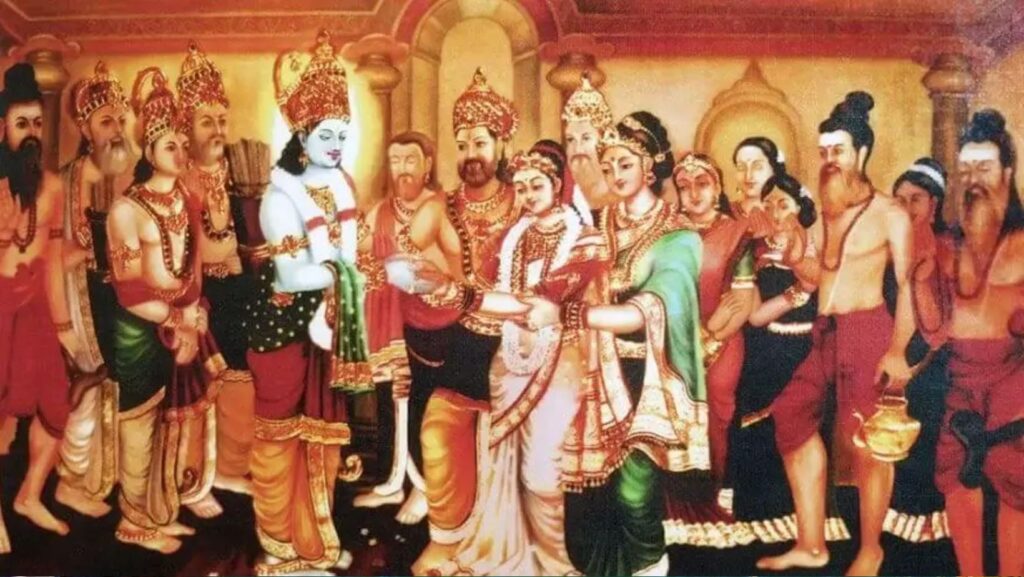Step into the realm of ancient epic, where courage and destiny intertwine in the complete tale of Sita’s Swayamvar. This gripping narrative unfolds the timeless story of a remarkable woman who, through a unique challenge, found her true love. In this captivating saga, we delve into the rich tapestry of culture, love, and honor, as Sita’s Swayamvar reveals the extraordinary journey of a heroine who defied convention and carved her own path in a world of legendary proportions.
The Prelude
To grasp the core of Sita’s Swayamvar, it is imperative to embark on a journey into the tapestry of the Ramayana. This venerable epic, ascribed to the revered sage Valmiki, weaves a narrative of the life and exploits of Lord Rama, an embodiment of Lord Vishnu, alongside his cherished consort, Sita. The saga unfurls its origins with King Dasharatha of Ayodhya, driven by an unquenchable thirst for a rightful heir to his throne. His fervent supplications find solace through a momentous Yajna, a ritual of profound sacrifice, ultimately bestowing upon him the gift of four sons, with the eldest being Rama.

As Rama matures, news of his exceptional qualities and valor spread far and wide. He eventually meets Sita, an incarnation of the goddess Lakshmi, and the two fall deeply in love. Their union seems divinely ordained, yet their path to happiness is strewn with thorns.
Sita’s Swayamvar: A Test of Valor
The central episode of the Ramayana is the Swayamvar, where Sita’s hand in marriage is to be won by the bravest suitor. Janaka, Sita’s father and the ruler of Mithila, organizes a grand event that attracts princes and nobles from across the land. The challenge is to lift Lord Shiva’s divine bow and string it, a task believed to be impossible for ordinary mortals.
Rama’s participation in the Swayamvar is no accident. His arrival in Mithila is a twist of fate, and his love for Sita is his motivation to win her hand. His divine destiny is evident as he effortlessly lifts and strings the colossal bow, breaking it in the process, much to the astonishment of the assembled gathering.
Also read – The Sacred Bond: Diwali and Lord Shree Ram
Sita’s Choice
In the heart of the story, Sita’s swayamvar becomes a choice of the heart rather than a mere formality. As she gazes into Rama’s eyes, she recognizes him as the one meant for her. Her choice is not influenced by social status or power but by a deep, spiritual connection. This choice echoes the timeless wisdom that love is the most potent force in the universe, transcending societal norms and boundaries.
Rama’s Exile
Despite the triumph at the Swayamvar, the story takes a dark turn. King Dasharatha, due to an oath he had made to one of his queens, Kaikeyi, is forced to exile Rama into the forest for 14 years. Sita, in an act of unwavering devotion, chooses to accompany her beloved husband into the wilderness, even though she has never experienced a life outside the palace.
The Forest Exile
Sita and Rama’s years in the forest become an embodiment of resilience and love. They face numerous trials and tribulations, including encounters with demons, but their love remains unwavering. Sita’s strength, resilience, and unwavering devotion shine as she adapts to the harsh conditions of the forest and remains a source of inspiration for generations to come.
The Kidnapping
One of the most tragic events in the Ramayana is the kidnapping of Sita by Ravana, the demon king of Lanka. Sita’s purity and virtue make her a target for Ravana’s lust and ambition. She remains steadfast, refusing to yield to his advances, waiting for Rama to rescue her.
The Great War
The story takes an epic turn as Rama, with the help of his loyal allies, including the monkey-god Hanuman, builds an army and wages a colossal war against Ravana to rescue Sita. The great battle of Lanka is a testament to the power of good over evil, and the devotion of Rama and his love for Sita become a symbol of hope and righteousness.
Reunion and Return
Rama’s victory over Ravana results in the rescue of Sita. Their reunion is a poignant moment, where love conquers all adversities. However, Sita’s purity is questioned by some in the kingdom, leading to her voluntary exile to the forest.
A Symbol of Virtue
Sita’s final exile into the earth, her mother, symbolizes her unwavering commitment to her virtues and her role as the ideal wife. Her sacrifice becomes a symbol of purity and selflessness that continues to inspire and guide generations.
Also read – Lessons from the Life of Lord Shri Ram: A Timeless Guide for Humanity
Also read – Is There Any Evidence Of Ramayana? Know About That
Conclusion
In the enchanting tale of Sita’s Swayamvar, we witness the timeless power of love and destiny. Sita’s choice, symbolizing her unwavering devotion to virtue and righteousness, ultimately leads to the triumph of good over evil. This story serves as a reminder that true love transcends worldly obstacles, and that one’s virtue can shape the course of history. Sita’s Swayamvar is a testament to the enduring resonance of ancient epics, where love and virtue unite to create a profound legacy.
Also read – 9 Days and 9 Forms of Mata during Navratri
